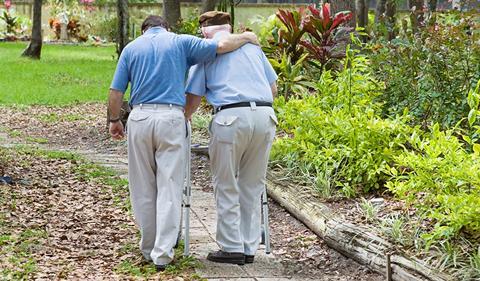Dementia is one of the biggest challenges the NHS faces and it is time to make care less institutionalised and more focused on the people it’s for, says Debra Keeling

Dementia care
The Health Secretary Jeremy Hunt recently warned that dementia has replaced cancer as the biggest challenge facing the NHS and that we must entirely overhaul the way we look after elderly people.
We’re all living longer, so we are all facing a higher risk of one day developing dementia – statistics demonstrate that one in three people over the age of 65 will develop the condition. The Alzheimer’s Society predicts this number will double in the next 40 years.
‘Methods of dementia care have been very institutionalised, with too much significance placed on routine and efficiency’
The Royal Masonic Benevolent Institute (RMBI) is committed to making its dementia care service exceptional and our substantial investment in dementia care training and new approaches to delivering quality care is benefiting residents with the condition who are living in our 17 UK homes.
Until recently, methods of dementia care have been very institutionalised, with too much significance placed on routine and efficiency. We are dedicated to taking care back to a very personal level; treating every resident as an individual, capable of expressing their own thoughts and emotions and deserving of a high quality of life, no matter how onset their dementia may be.
Breaking down barriers
In order to make care more personal, certain boundaries and barriers between staff and residents were removed − such as losing staff uniforms and eating the main meal of the day all together, at times suited to the residents − so the two groups run the home together.
The idea is to improve the quality of the lived experience − not only for those residents living with a dementia, but also for the other residents living in the same home.
‘New methods of dementia care in our homes are not limited to interaction between staff and residents’
Training is integral for this type of personal care and care staff at the homes have the opportunity to undertake a diploma course with Dementia Care Matters. Feedback has been extremely encouraging, with home mangers in agreement that the new style of care gives them the confidence to join residents in their reality, without being accused of infantilising them, while empowering them to deliver personal, individual care. All other staff − from gardeners to trustees − have also attended courses run by the Alzheimer’s Society.
The best surroundings
New methods of dementia care in our homes are not limited to interaction between staff and residents; environment and surroundings are integral to quality of life and innovative steps are being taken in this field.
‘It is time we paid more attention to dementia care to ensure that individuals enjoy the best possible quality of life’
A number of homes have introduced special sensory gardens for residents living with dementia to provide an outside space for reflection and exploration. For example, to encourage interaction among the residents at Prince Edward Duke of Kent Court in Essex, the sensory garden includes raised flower beds and hanging baskets so that people have easier access to them.
To help with visual impairment, colours, shapes and special features have been introduced to help create a sensory environment. To aid hearing, wind chimes and water features have been introduced into the gardens, as well as textured gravel paths. Herbs and vegetables are grown in the gardens so that the residents can also taste the fresh homegrown produce.
Reminiscence plays an integral part in creating the right environment for quality dementia care, from what is being served for meals to the design of communal spaces. “Memory boxes” − treasure troves of objects old and new − are made available for residents to explore and to aid in the stimulation of long term memory.
With greater emphasis finally being placed on raising awareness of dementia, it is time we paid more attention to, and developed more resources for, dementia care to ensure that individuals enjoy the best possible quality of life.
Debra Keeling is deputy director of care at the Royal Masonic Benevolent Institute


























No comments yet